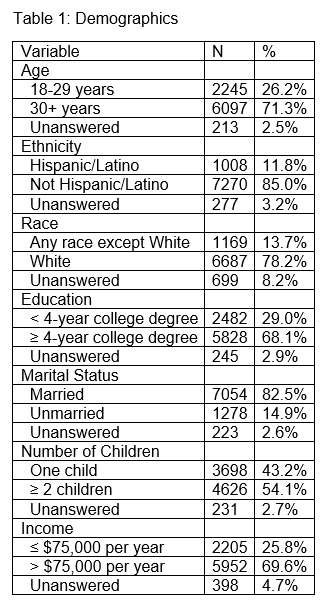Public Health & Prevention
Category: Abstract Submission
Public Health & Prevention II
589 - Which Parents are Most Concerned that their Child’s Safety Seat is Incorrectly Installed?
Saturday, April 23, 2022
3:30 PM - 6:00 PM US MT
Poster Number: 589
Publication Number: 589.241
Publication Number: 589.241
Heather Spielvogle, Seattle Children's, Seattle, WA, United States; Nicolas Dundas, Seattle Children's, Seattle, WA, United States; Christine Spina, University of Colorado School of Medicine, Aurora, CO, United States; Cathryn Perreira, University of Colorado, Anschutz - ACCORDS, Aurora, CO, United States; Jeffrey Robinson, Portland State University, Portland, OR, United States; Sean T. O'Leary, University of Colorado School of Medicine, Denver, CO, United States; Doug Opel, University of Washington School of Medicine, Seattle, WA, United States

Heather Spielvogle, PhD
Research Supervisor
Seattle Children's
Seattle, Washington, United States
Presenting Author(s)
Background: Motor-vehicle collisions are the third leading cause of injury-related deaths among newborns and infants in the United States. The American Academy of Pediatrics recommends that children ≤4 years old be secured in child safety seats (CSS) when traveling in a motor vehicle. Correctly installed, CSS reduce the risk of death by 28%. However, 61% of forward-facing CSS are estimated to be incorrectly installed. One contributing factor to incorrect CSS installation is low parental confidence.
Objective: To assess the proportion and characteristics of parents who are concerned about incorrect CSS installation.
Design/Methods: English- and Spanish-speaking parents ≥18 years old with an infant ≤2 months old receiving health supervision at one of 24 primary care pediatric clinics in Colorado and Washington were eligible. Participating clinics were part of an ongoing cluster randomized controlled trial to test the effect of a clinician communication strategy on child immunization status. Participants completed a brief survey prior to their child’s 2-month health supervision visit that included demographic items and childhood health questions including the item “how concerned are you that your child’s car seat is incorrectly installed?” (response categories of not at all concerned, not too concerned, not sure, somewhat concerned, and very concerned). We used descriptive statistics to quantify the proportion of parents who were concerned (i.e., responses of somewhat concerned/very concerned). We used Pearson's chi-squared test to assess the association of parent concern about correct CSS installation and demographics.
Results: There were 8555 parents included in analysis, 86% of whom were mothers (Table 1). Overall, 10.9% of parents reported concern that their child's car seat was incorrectly installed (6.7% very concerned, 4.2% somewhat concerned). Parents who were concerned about incorrect CSS were significantly more likely to be younger than 30 years old, have less than a 4-year college degree, be unmarried, earn less than $75,000 per year, and be Hispanic or Latino (p < .01 for all, see Table 2).Conclusion(s): More than 1 in 10 parents are concerned about incorrect CSS installation, and this concern is higher among those with lower socioeconomic status. Early identification of and intervention with parents who express concern may improve correct CSS installation and thereby reduce mortality.
Table 1: Demographics Participant Demographics
Participant Demographics
Objective: To assess the proportion and characteristics of parents who are concerned about incorrect CSS installation.
Design/Methods: English- and Spanish-speaking parents ≥18 years old with an infant ≤2 months old receiving health supervision at one of 24 primary care pediatric clinics in Colorado and Washington were eligible. Participating clinics were part of an ongoing cluster randomized controlled trial to test the effect of a clinician communication strategy on child immunization status. Participants completed a brief survey prior to their child’s 2-month health supervision visit that included demographic items and childhood health questions including the item “how concerned are you that your child’s car seat is incorrectly installed?” (response categories of not at all concerned, not too concerned, not sure, somewhat concerned, and very concerned). We used descriptive statistics to quantify the proportion of parents who were concerned (i.e., responses of somewhat concerned/very concerned). We used Pearson's chi-squared test to assess the association of parent concern about correct CSS installation and demographics.
Results: There were 8555 parents included in analysis, 86% of whom were mothers (Table 1). Overall, 10.9% of parents reported concern that their child's car seat was incorrectly installed (6.7% very concerned, 4.2% somewhat concerned). Parents who were concerned about incorrect CSS were significantly more likely to be younger than 30 years old, have less than a 4-year college degree, be unmarried, earn less than $75,000 per year, and be Hispanic or Latino (p < .01 for all, see Table 2).Conclusion(s): More than 1 in 10 parents are concerned about incorrect CSS installation, and this concern is higher among those with lower socioeconomic status. Early identification of and intervention with parents who express concern may improve correct CSS installation and thereby reduce mortality.
Table 1: Demographics
 Participant Demographics
Participant Demographics